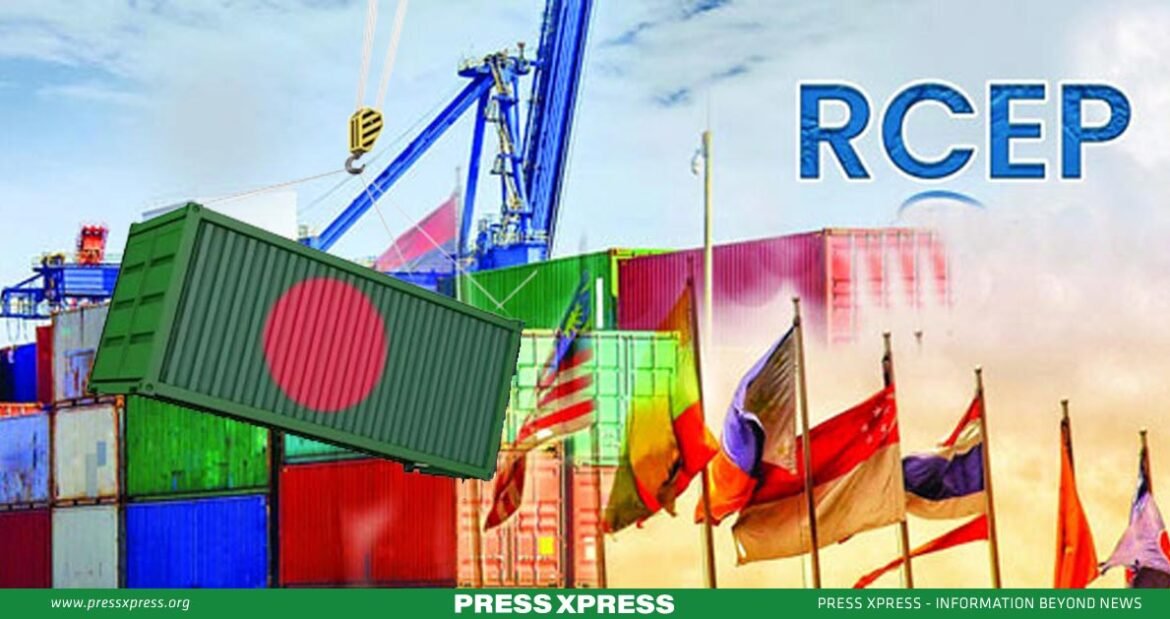India and Bangladesh are close neighbors and strategic partners, with a long history of trade and economic cooperation. However, the recent developments in the regional and global trade scenario have posed both challenges and opportunities for the two countries.
One of the major developments is the formation of the Regional Comprehensive Economic Partnership (RCEP), the world’s largest free trade area, comprising 15 countries in the Asia-Pacific region, including China, Japan, South Korea, Australia, and New Zealand. RCEP was signed in November 2020, after eight years of negotiations, but India opted out of the deal, citing concerns over its trade deficit with China and the lack of adequate safeguards for its domestic industries and farmers.

Bangladesh, on the other hand, has expressed its interest in joining RCEP, as it sees the potential benefits of accessing a huge market of 2.2 billion people and enhancing its export competitiveness. Bangladesh’s Ministry of Commerce has submitted a proposal to the cabinet for approval, and Foreign Minister AK Abdul Momen has said that a final decision will be taken after the parliamentary elections on January 7, 2024.
Bangladesh’s possible entry into RCEP has raised some apprehensions in India, as it could have implications for the bilateral trade and economic relations between the two countries. India is worried that RCEP could increase its trade deficit with China, as Bangladesh could become a conduit for Chinese goods to enter the Indian market at lower tariffs. India is also concerned that it could lose some of its market share in Bangladesh, as well as face competition from Bangladesh in other RCEP countries, especially in the textile and garment sector.
You can also read: China-Russia Trade Hits Record High, Surpassing $200 billion
In view of these concerns, India is reportedly adopting a cautious approach to the Free Trade Agreement (FTA) negotiations with Bangladesh, which have been ongoing since 2017. India is keen to finalize the Comprehensive Economic Partnership Agreement (CEPA) with Bangladesh, which would cover trade in goods and services, investment, economic cooperation, and technical assistance. India and Bangladesh have already signed several agreements and memoranda of understanding in various sectors, such as energy, connectivity, infrastructure, and defence, during the visits of Prime Minister Narendra Modi to Dhaka in 2015 and 2021, and Prime Minister Sheikh Hasina to New Delhi in 2017 and 2019.
However, India wants to assess the impact of RCEP on its trade and economic interests in the region before concluding the CEPA with Bangladesh, as per the sources quoted by The Hindu Business Line. India is also waiting for the outcome of the Bangladesh elections, which could have a bearing on the political stability and policy continuity in the country.
India And Bangladesh Enjoy Strong Trade Relations

Despite the challenges posed by RCEP, India and Bangladesh have a strong foundation and a shared vision for enhancing their trade and economic ties, as well as their overall friendship and partnership. Both countries have a common interest in promoting regional integration and connectivity, as well as addressing the issues of climate change, poverty, and development. Both countries have also shown resilience and solidarity in coping with the Covid-19 pandemic and its economic fallout.
According to the data from the Indian Ministry of Commerce, the bilateral trade between India and Bangladesh stood at $9.5 billion in 2019-20, down from $10.25 billion in 2018-19, due to the disruption caused by the pandemic. However, the trade volume has recovered and grown in the last few years, as both countries resume their normal economic activities and explore new avenues of cooperation. India is Bangladesh’s largest trading partner in South Asia, and Bangladesh is India’s eighth-largest export destination globally. India has also extended duty-free and quota-free access to Bangladeshi products under the South Asian Free Trade Area (SAFTA) agreement and has provided concessional lines of credit worth $10 billion to Bangladesh for various development projects.
India and Bangladesh have also made significant progress in resolving some of the longstanding issues in their bilateral relations, such as the land and maritime boundary disputes, the exchange of enclaves, and the facilitation of travel and transit. Both countries have also enhanced their cooperation in the fields of culture, education, science and technology, health, and tourism, among others.
As Bangladesh prepares to graduate from the least developed country status by 2026, it faces the challenge of diversifying its export basket and expanding its trade relations with different countries and regions. RCEP could be one of the options for Bangladesh to achieve this goal, but it also entails some risks and costs, such as the adjustment of tariffs, compliance with rules of origin, and the protection of domestic industries and consumers. Bangladesh will have to weigh the pros and cons of joining RCEP carefully and negotiate the best possible terms and conditions for its accession.
India, on its part, will have to balance its strategic and economic interests in the region and maintain its close and friendly ties with Bangladesh, regardless of its decision on RCEP. India and Bangladesh have a unique and special relationship, based on mutual trust, respect, and cooperation, which transcends the narrow calculations of trade and commerce. Both countries have the potential and the opportunity to deepen their partnership and work together for the prosperity and well-being of their people, as well as the peace and stability of the region.


